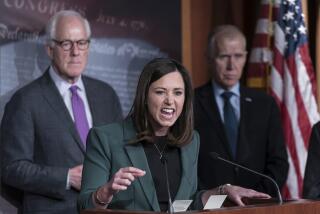Bipartisanship is good for both sides
Over the last two weeks, a number of columnists and foreign policy analysts have advocated a return to bipartisanship and civil discourse as the best course for America’s future. These suggestions have ignited hot responses by bloggers, primarily on the left, who see “bipartisanship” as the Washington elite’s codeword for capitulation by Democrats to the Bush administration on Iraq and other major policy issues. Last week, Atlantic Monthly blogger Matthew Yglesias wrote in the Los Angeles Times that the invasion of Iraq itself “was a completely bipartisan affair” and that the “current elites” are merely concerned about losing their “cozy positions” to “some new experts who’ve shown better judgment.”
This kind of debate about bipartisanship is a political perennial, but in this case it threatens to obscure the underlying issues. Bipartisanship for its own sake is meaningless and even anti-democratic, dulling the edges of political debate and muting opposition. It is valuable only if it produces actual policy progress. Thus the central question to ask about the value of a potential bipartisan initiative on Iraq is whether such an initiative could actually produce a policy better than “wait and pray something good will happen before the surge ends” or “admit defeat and pull out now, leaving the Iraqis to their fate and risking the complete collapse of a critically important country in one of the most dangerous and important regions in the world.”
I and a number of columnists, foreign policy analysts and members of Congress, argue that a bipartisan initiative on Iraq has the best chance of producing a policy that will allow us to begin a sustained withdrawal of our combat troops beginning in March 2008, while meeting our obligations to the Iraqi people and protecting our long-term national security interests. That is not a claim about “winning the war in Iraq.” And it is a risky and uncertain strategy. But is the best of a host of bad options.
This is the case made by the Iraq Study Group, led by former Republican Secretary of State James Baker and former Democratic House leader Lee Hamilton, which assembled a group of almost 50 people to study the situation in Iraq as closely as possible over eight months. The Baker-Hamilton report concluded that our current strategy was not working and recommended a combination of a strong regional push to engage Iraq’s neighbors constructively in the future of Iraq, coupled with a steady shift of U.S. troops out of direct combat roles into support roles for Iraqi troops, allowing the withdrawal of current combat troops. The Baker-Hamilton report allowed for the possibility of a temporary surge, but only if it was coupled with this longer-term strategy.
Today, the U.S. military is making some progress in buying time for a political solution, but the political solution, which every U.S. military commander and the Bush administration itself admits is the only possible route to ending the violence in Iraq, is not forthcoming. In this context, as the Baker-Hamilton report also recommended, the U.S. has to make its own decisions independent of the complexities of Iraqi politics.
We should hear from Gen. David Petraeus, the top military commander in Iraq, in September and then announce a timetable for shifting the nature of U.S. operations in Iraq, withdrawing combat troops as the surge comes to an end and turning to special operations and support of Iraqi troops. That timetable, in turn, is the lever we now need to bring other regional and international actors to the table to create the regionwide Iraq Support Group envisioned by the Baker-Hamilton report.
The Baker-Hamilton report itself did not support putting forward a timetable for U.S. operations. That is a principal reason that the Democratic Senate leadership opposed a bipartisan resolution led by Sen. Ken Salazar (D-Colo.) and Sen. Lamar Alexander (R-Tenn.) and supported by 10 other moderate Democrats and Republicans that would have written the recommendations of the Baker-Hamilton Report into law. I agree that, as written last December, those recommendations do not go far enough. But that resolution would have been the first step toward building a genuine bipartisan coalition in Congress able to put real pressure on the administration after the Petraeus report in September.
The alternative is just more political grandstanding, as evidenced by an odd bedfellows coalition of the “netroots” and neocons. For the netroots, as Yglesias argued last week, a bipartisan coalition endorsed getting into the war, so any calls for bipartisanship today must be a cover for staying in. Besides, the ideological purity of “pull out now” is preferable to the kind of messy political compromise that is likely to get us out.
On the right, head-in-the-sand support for staying the course combines with the attractive political option of temporizing until November 2008 and then dumping the whole mess in the Democrats’ lap, allowing Republicans to reap the long-term advantages of pinning the Democrats with the loss of another war.
The ferocious anger felt and expressed by Yglesias and others about the stupidity, waste and danger of this war is palpable and justifiable. But the country as a whole does not have the luxury of giving in to the temporary catharsis of anger and blame-mongering. A bipartisan solution is politically risky and emotionally unsatisfactory. But it is the only way.
Anne-Marie Slaughter is dean of the Woodrow Wilson School of Public and International Affairs at Princeton University and author of “The Idea That Is America: Keeping Faith with Our Values in a Dangerous World.”
to read about The Times’ Blowback feature.
More to Read
A cure for the common opinion
Get thought-provoking perspectives with our weekly newsletter.
You may occasionally receive promotional content from the Los Angeles Times.






